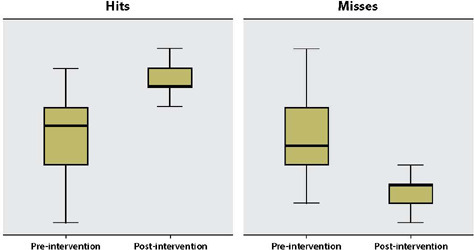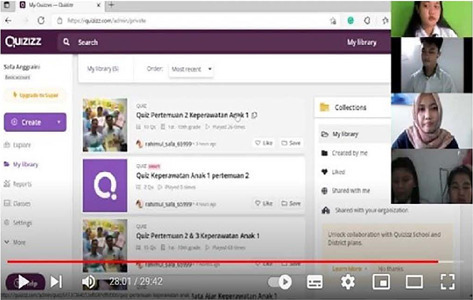-
ORIGINAL ARTICLE
The relationship between gender, educational background, and learning environment with nursing student’s anxiety
Revista Brasileira de Enfermagem. 2024;77(6):e20220615
12-16-2024
Abstract
ORIGINAL ARTICLEThe relationship between gender, educational background, and learning environment with nursing student’s anxiety
Revista Brasileira de Enfermagem. 2024;77(6):e20220615
12-16-2024DOI 10.1590/0034-7167-2022-0615
Views0See moreABSTRACT
Objectives:
to identify variables associated with nursing students’ anxiety-related clinical practice.
Methods:
this study used a correlational quantitative descriptive design with the STROBE equator instrument. The population is 233 nursing students with a sample of 135. Data were collected from March to April 2022 using validated instruments.
Results:
the Chi-square test and the sig likelihood ratio on the gender, educational background, and learning environment is more than 0.05 so there is no significant relationship between the variables and student anxiety.
Conclusions:
students need to be prepared again before entering the practice field. Qualitative research is needed too.
-
ORIGINAL ARTICLE
Reflective practice of nurse residents in the teaching-learning process in teaching hospitals
Revista Brasileira de Enfermagem. 2024;77(4):e20230540
09-06-2024
Abstract
ORIGINAL ARTICLEReflective practice of nurse residents in the teaching-learning process in teaching hospitals
Revista Brasileira de Enfermagem. 2024;77(4):e20230540
09-06-2024DOI 10.1590/0034-7167-2023-0540
Views0See moreABSTRACT
Objective:
To analyze reflective practice in the teaching-learning process of nurses in residency programs in teaching hospitals in Minas Gerais, Brazil.
Methods:
Case study, based on the reflective practice framework, conducted in two teaching hospitals. Observation and interviews were conducted with first and second-year residents, and five participants were included for in-depth analysis, with their data subjected to frequency distribution analysis and Critical Discourse Analysis.
Results:
In 519 observed activities, elements of reflection were identified in 22.2%, especially active listening and expression of doubts. Discourses indicated practice as the best moment for teaching-learning due to its potential to generate reflections. Learning by doing and case discussion were considered potential strategies for reflective learning.
Conclusion:
Know-in-action reflection was evidenced as the predominant formative aspect for residents, with few opportunities for reflection on reflection-in-action.
-
ORIGINAL ARTICLE
Workshop on pediatric trauma care: low-cost simulation
Revista Brasileira de Enfermagem. 2023;76:e20210485
12-08-2023
Abstract
ORIGINAL ARTICLEWorkshop on pediatric trauma care: low-cost simulation
Revista Brasileira de Enfermagem. 2023;76:e20210485
12-08-2023DOI 10.1590/0034-7167-2021-0485
Views0See moreABSTRACT
Objective:
to assess nursing students’ and nurses’ knowledge, satisfaction and self-confidence after a theoretical workshop on emergency care for traumatized children and clinical simulation.
Methods:
a quasi-experimental study, carried out with nursing students and nurses residing at a public university in southern Brazil. A workshop on pediatric trauma care was created and a mannequin was created for simulations. A knowledge pre-test and post-test and the Student Satisfaction and Self-Confidence in Learning instrument were applied to measure satisfaction and self-confidence in learning. For analysis, descriptive statistics and the Wilcoxon test were used to compare means before and after intervention.
Results:
the difference between misses and hits was statistically significant (p<0.005), demonstrating an increase in participants’ knowledge after the workshop. Satisfaction and self-confidence were demonstrated in the instrument’s high scores.
Conclusions:
the effectiveness of the workshop in teaching-learning emergency care for pediatric trauma was demonstrated.

-
ORIGINAL ARTICLE
The effectiveness of using interactive multimodality books in pediatric nursing in implementing Merdeka Belajar program
Revista Brasileira de Enfermagem. 2023;76(5):e20220599
11-10-2023
Abstract
ORIGINAL ARTICLEThe effectiveness of using interactive multimodality books in pediatric nursing in implementing Merdeka Belajar program
Revista Brasileira de Enfermagem. 2023;76(5):e20220599
11-10-2023DOI 10.1590/0034-7167-2022-0599
Views0See moreABSTRACT
Objectives:
to analyzing the Effectiveness of Using Interactive Multimodality Books in Pediatric Nursing on Student Learning Outcomes in Implementing the Merdeka Belajar Program.
Methods:
the research design used a quasi-experimental approach with a posttest control group design. The sample in this study was the fourth-semester nursing students of Institute of Health Science Suaka Insan Banjarmasin who received the Pediatric Nursing course, a total of 52 students. The sampling technique used is total sampling. Data analysis used the dependent t-test.
Results:
the interactive multimodality pediatric nursing book was effective in improving the learning achievement of fourth-semester students with a significance value of 0.015 < 0.05. There is a difference in the average value of pediatric nursing courses for class A and class B, which is 3.173.
Conclusions:
the use of interactive multimodality books is very good for lecturers to apply in teaching to help students understand the material they are learning.

-
ORIGINAL ARTICLE
Clinical supervision strategies, learning, and critical thinking of nursing students
Revista Brasileira de Enfermagem. 2023;76(4):e20220691
10-09-2023
Abstract
ORIGINAL ARTICLEClinical supervision strategies, learning, and critical thinking of nursing students
Revista Brasileira de Enfermagem. 2023;76(4):e20220691
10-09-2023DOI 10.1590/0034-7167-2022-0691
Views0See moreABSTRACT
Objective:
To identify the supervisory strategies that Nursing students consider facilitators of the development of critical thinking skills in clinical teaching.
Methods:
This is a qualitative study, within the interpretative paradigm, using the focus group methodology. Eight undergraduate nursing students participated in the study.
Results:
Participants recognized the indispensability of critical thinking for professional responsibility and quality of care and highlighted the importance of using supervisory strategies adapted to their needs, learning objectives, and the context of clinical practice.
Final considerations:
This study highlights the urgent need to establish, within the Nursing curricula, clinical supervision strategies that promote critical thinking and favor the development of skills for good clinical judgment, problem solving, and safe, effective, and ethical decision-making.
-
ORIGINAL ARTICLE
Learning strategies of undergraduate nursing students during the COVID-19 pandemic
Revista Brasileira de Enfermagem. 2023;76(5):e20220764
10-06-2023
Abstract
ORIGINAL ARTICLELearning strategies of undergraduate nursing students during the COVID-19 pandemic
Revista Brasileira de Enfermagem. 2023;76(5):e20220764
10-06-2023DOI 10.1590/0034-7167-2022-0764
Views0See moreABSTRACT
Objectives:
to analyze the learning strategies used by nursing students from a public university, in remote teaching, during the COVID-19 pandemic.
Methods:
a cross-sectional study developed with nursing students who attended remote teaching classes. The sample was obtained by convenience and data were collected online, with 112 participants. Student and Mann-Whitney tests were performed for data analysis.
Results:
the most frequently used learning strategies were self-regulatory and cognitive. There was moderate use of interpersonal help-seeking and emotional control strategies. Male students, with a private study environment and good internet connection, used emotional control strategies more frequently.
Conclusions:
self-regulatory and cognitive learning strategies, appropriate for higher education, were frequently used by nursing students, which is an important tool for adapting these students to the university context.
-
ORIGINAL ARTICLE
Perception of graduates about the education of Nursing Technicians
Revista Brasileira de Enfermagem. 2023;76(5):e20220325
10-06-2023
Abstract
ORIGINAL ARTICLEPerception of graduates about the education of Nursing Technicians
Revista Brasileira de Enfermagem. 2023;76(5):e20220325
10-06-2023DOI 10.1590/0034-7167-2022-0325
Views0ABSTRACT
Objectives:
to interpret the perception of graduates from the nursing technician program on the learning process developed during their education.
Methods:
a qualitative study was conducted from March to September 2021, based on interviews with 20 graduates from a nursing technician program at a school in the Midwest of São Paulo, using thematic analysis and the NVivo tool.
Results:
the following themes were identified: traditional teaching methods, active learning strategies, valuing proactivity and experiences in professional practice.
Final Considerations:
according to the graduates, the teaching process is essentially based on traditional methods, although there are initiatives to implement active strategies and recognition of the importance of advancing student proactivity and practical experience.
Keywords:AssociateEducationEducation, NursingHealth Human Resource TrainingLearningProfessional TrainingSee more
-
ORIGINAL ARTICLE
Teaching entrepreneurship in undergraduate Nursing course: evaluation of an educational proposal
Revista Brasileira de Enfermagem. 2023;76(2):e20210244
02-06-2023
Abstract
ORIGINAL ARTICLETeaching entrepreneurship in undergraduate Nursing course: evaluation of an educational proposal
Revista Brasileira de Enfermagem. 2023;76(2):e20210244
02-06-2023DOI 10.1590/0034-7167-2021-0244
Views0See moreABSTRACT
Objective:
To evaluate a proposal for teaching entrepreneurship in an undergraduate Nursing course that uses active methodologies and activities based on the theory of meaningful learning.
Methods:
Interventional, prospective study, with a quantitative perspective, with a total of 102 participating students, carried out from July 2017 to December 2019 at a public university in the state of Sao Paulo. Statistical analysis were performed by non-parametric Chi-square or Fisher’s exact tests, with differences considered statistically significant if p < 0.05.
Results:
Improvements were observed in almost all items evaluated, revealing that meaningful learning became more effective with the use of active teaching methodologies. Most students need adaptation and effort to be put into these methods.
Conclusions:
The proposal offers pedagogical content adaptation, specifically for nursing students. New research should expand teaching-learning techniques for the development of future nurses, preparing them adequately for the job market.




